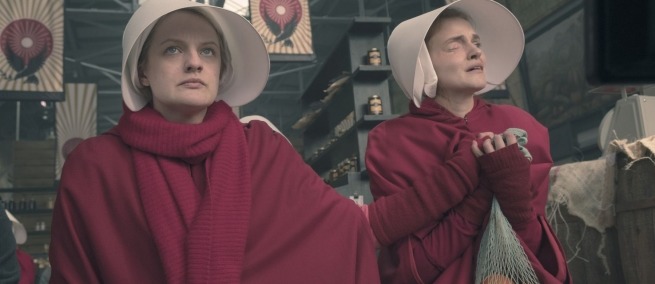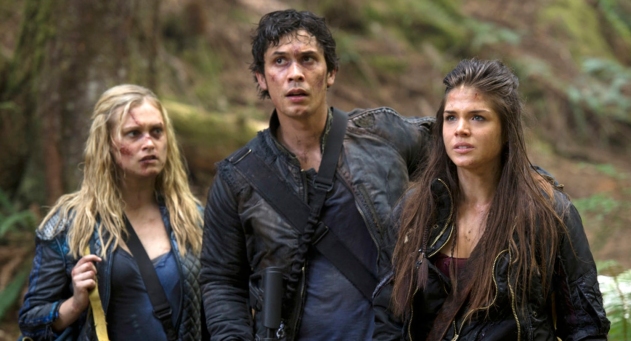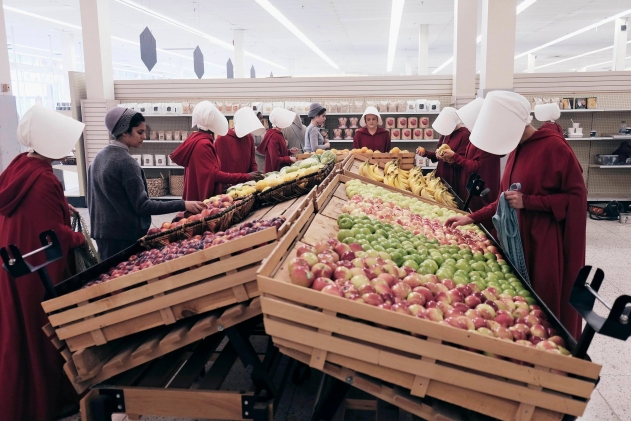
Dorothy Fortenberry is an accomplished playwright and screenwriter who has been invested in scientific themes, particularly climate change, throughout her career. Most recently, she was a writer and producer on the first four season of Hulu’s award-winning adaptation of The Handmaid’s Tale, and is an executive producer on Apple TV+’s new anthology series EXTRAPOLATIONS, directed by Scott Z. Burns and starring Meryl Streep, Edward Norton, Cherry Jones, Sienna Miller, Daveed Diggs, and more. The show is in production and will premiere in 2022. Fortenberry also has a new play, “The Lotus Paradox,” about climate change and children’s literature that is having its world premiere at the Warehouse Theatre through February 6. Fortenberry is the past recipient of two grants from the Alfred P. Sloan Foundation’s partnership with Ensemble Studio Theater. We spoke about her career and the differences between post-apocalyptic, near future, and climate storytelling.
Science & Film: It seems like in your work for the stage and screen, broadly speaking, you are interested in our conception of the future, particularly as it relates to climate change. How did that come about?
Dorothy Fortenberry: I became interested in/aware of/terrified by climate change a while ago—a middle-school science teacher was talking about greenhouse gases, and it sparked something. I became that kid who insisted we recycle, and who was thinking about that kind of stuff. It continued to be a personal interest, but it wasn’t something I thought would be involved in my work necessarily. I was also having a career as a playwright, then as a television writer. As a playwright, I gravitated towards questions about the current moment or the very near future. Some of my plays would take place in a world where one small scientific change had been made, but it was a fathomable advance. For example, I have a play that deals with bioethics and the kind of genetic testing available in the play is not technically in the world, but it isn’t an unfathomable leap considering all the things that are being genetically tested for and our understanding of the genome. That was the kind of story I was drawn to as a playwright.
My plays also tend to focus on things that I find ethically complicated. Plays, as a form, do a great job with conflict and complexity because you have a bunch of characters talking for two hours about something, and it rarely comes to a definable conclusion. While I was doing all of that work, I started doing television writing.
The larger forces within the entertainment industry in the early 20-teens, which is when I was getting into [television writing], were really hyped up on the apocalypse. You had THE WALKING DEAD, THE HUNGER GAMES, and as a cultural analyst I might say that some of that interest in the apocalypse was our collective unconscious wrestling with climate change. But those stories weren’t explicitly defined as climate stories at all, and they were post-apocalyptic; a thing happened and it is unfixable, and the quest right now is that we need a bottle of water. You had a very defined task in the present moment and then some previous event that had made everything the way that it was.
S&F: Sort of like THE MATRIX.
DF: Totally. They were all: how do we live within the aftermath of the event, but the event is accomplished and irreversible. So, in that moment, I landed on a post-apocalyptic show called THE 100 on the CW and plunged into that kind of storytelling. I also became the person in the writer’s room saying: what if it was climate change? THE 100 was a dark, action-adventure show about juvenile delinquent teens on an irradiated Earth. Very fun, very violent. There was some nuclear catastrophe before the pilot began, but the precipitating events were not defined, and I kept saying, what if it was climate? That was not the direction the show went in for a number of reasons. I was one of a collective of writers, and in television you make your best case and if you are outvoted, you get a cup of coffee and move along, as I did. But spending three years on that show made me think a lot about apocalypse stories and why we tell them.

THE 100
From there, I spent four years on THE HANDMAID’S TALE, which was a more near-apocalypse story. Instead of being hundreds of years in the future of an event, especially in the early seasons, it focused on a near alternate reality. Because there was a heavy use of flashbacks, it felt like we were trying to straddle and understand the event. That was really exciting to me, because I had started to feel like it was a real absence in the conversation to only talk about “after the event.” There is interesting storytelling you can tell around why the apocalypse happens.
There is an environmental focus in THE HANDMAID’S TALE that was also very present in the source material, but Margaret Atwood wrote the book in 1986 and, understandably, the thing she’s concerned about is acid rain and nukes. For the television adaptation, we moved the timeline to present day (it was 2016 my boss started the writers’ room) and said, let’s make it a climate-induced fertility catastrophe that allows for the rise of an eco-fascist regime. That doesn’t seem super impossible so far as apocalypses go [laughs]. It was fun because we got to do things like give the bad guys electric cars and solar panels. I am certainly someone who is pro-environment and pro-baby, but we also got to say, what is the darkest version of a pro-environment and pro-baby platform?

THE HANDMAID'S TALE
I left after four seasons of THE HANDMAID’S TALE to go to this show EXTRAPOLATIONS, which is explicitly about climate change. It will be on Apple TV+ and is a future-oriented anthology. At its best, the show is not an apocalypse or dystopia, but it’s also not a utopia. It’s about, what if we keep muddling along and don’t get better but don’t get markedly worse, what does that look like? That felt like a really interesting question that often goes unasked. There doesn’t have to be zombies or intergalactic warfare, or a huge terrible event, it’s just everyday life and we don’t get much better—what does that look like?
S&F: One of the challenges that people have talked about in terms of dramatizing or writing about climate change is that enacts what some people call a slow violence that can be hard to define. Even technically speaking climate change isn’t a disaster so it’s not eligible for certain federal resources. How have you thought about approaching it narratively?
DF: I think climate change opens up different possibilities than we’re used to thinking of for how events occur within narrative. I don’t know if you saw the film CODA, but I think that’s a great climate change movie because the eventis: the water is getting warmer, and the fishermen can’t access the fish they used to. The film is mostly about singing, but the background is climate-induced resource catastrophe that is exacerbated by people, and then the question is, what does labor do as a response? That is a great way to tell a climate story. If you only make climate stories about people who trapped in a natural disaster or are scientists, that’s a small number of people. Most people are not going to be in a natural disaster and most are not scientists. But this idea that your family has done this job for generations, the natural world is changing, the job is now unstable, your family’s economic circumstances are perilous, what do you do? A lot of people are going through that experience and more will.
If I could wave a magic wand and make a million climate change stories, I wouldn’t make a million stories about natural disasters, I would a million stories like CODA—she just wants to sing! She’s not invested in climate change but it’s coming for her, and it’s going to affect her life whether or not she cares about it. That is the most difficult but also maybe the most interesting and rewarding way to do climate storytelling.
S&F: Maybe another way of framing what you’re talking about is telling specific stories about a global problem.
DF: Absolutely. For me, coming from theater, you’re always so limited in terms of resources, so you have to get incredibly specific. You’re only telling the story this group of actors can tell in a space, and universality will come out of it, but you will be grounded in place in time and with those people. For me, that’s the most exciting storytelling that I can think of. That’s what we’ve tried to do with EXTRAPOLATIONS.
S&F: I’m curious how it feels to you spending time with this sort of material? Is your hope that it will cause someone to rethink their relationship to climate change? Does it feel cathartic or frustrating?
DF: This may say way more about me than about writers writ large, but I am much happier if I am working on something related to something I am worried about than if I am not. I have been at my most depressed, anxious, unhappy, self-destructive—pick your negative—when I have been unemployed or between projects and just consuming media and feeling overwhelmed and powerless. I cannot possibly know whether the work that I do will do any good whatsoever. It’s very hard, probably impossible, to pinpoint a causal effect your work will have in the world. But I can be very clear the causal effect it has for me is that I sleep a lot better at night if I read the most depressing things in the world and then write something about them.
Working on THE HANDMAID’S TALE, I was reading every story about violence against women, refugees, sexual violence, and I was pausing and thinking, this is your job, you have to read the whole thing. But also, I was able to go into a room and do something with it and not just feel like I was holding fear and sadness with no place to put it down. That’s me and the way I’m constituted. I’m sure someone else would think I was nuts. But I felt very grateful to go through 2016-2020 with THE HANDMAID’S TALE, with a place to put a lot of the things I was feeling, and a job that felt like it was connected to the things I was worrying about. Similarly with working on a show about climate, I would be thinking these things anyway, at least now I have something I can do about it instead of being sad at my desk.
I also think climate change is such a collective action problem and problem about how we relate to other people. There is climate storytelling where you talk about climate and temperature, but I also feel like any storytelling that asks, how do we operate as a group, conceive of humanity, and relate to each other, is in a way climate storytelling. Anything that is trying to figure out what it looks like to form collectivity and a sense of mutual obligation. If we don’t have a sense of unity, then I feel like climate change becomes another disruptive event that can be used to exacerbate existing inequalities.
S&F: That speaks to the fact that climate change is not going to be solved by any individual action, but how do we take collective action?
DF: It’s hard, and it’s hard to make in filmic narrative. If we’re all operating under a hero’s journey model, explicitly about one person and that person’s quest, what do you do if that’s the template for your narrative art form and can’t be the solution? Hollywood has built an incredibly capable, successful, and talented mechanism of telling the story of one lone dude flying a rocket into the sun. It requires deconstructing and rebuilding what a movie even looks like to try and tell a story where that’s neither the focus nor the point.
♦
TOPICS